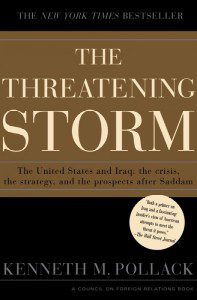
The debate over the Iraq war was not polarized according to liberal/conservative fault lines, but stretched across them. In fact, many liberals found themselves reluctantly swayed by the arguments for war, especially after Kenneth Pollack’s book <a href="The Threatening Storm: The Case for Invading Iraq“>The Threatening Storm was published in September 2002, roughly the one-year anniversary of 9-11 and 6 months prior to when the actual invasion began.
In a nutshell, liberals were convinced by fear over the threat of Saddam Hussein possessing WMDs – nuclear and chemical; as well as humanitarian concerns. Both of these issues are still relevant in the recent and ongoing debates about action towards North Korea, Iran, Syria and Libya.
Perhaps the most famous liberal who supported the war was Hillary Clinton, who as a newly-minted Senator voted for the Authorization to Use Military Force (AUMF) against Iraq in October of 2002 (and gave a speech about it). It is notable that she recanted her support for the war during the primary in 2008 while running against Barack Obama, and chose yesterday, the 10-year anniversary of the Iraq War, to publicly come out in favor of gay marriage.
Liberal bloggers were also misled by these arguments into supporting the war, for example writer Matthew Yglesias, who in 2010 distilled his error into 4 reasons. Another was Thomas Nephew, who is a friend of mine, who wrote a very lengthy piece entitled “with regrets, for war on Saddam” that is perhaps the best-argued case for war that existed at the time. This is one of the truly landmark pieces in the blogsphere, because it accurately maps out every facet of the debate in liberals’ minds, and is a must-read. Thomas has kindly given me permission to repost it in full here at City of Brass which I will do later today.
Like most of the liberals who supported the war, Thomas changed his assessment early on into the campaign when it became obvious that the existence of WMDs was a mirage, and chaos from the poorly-planned postwar management of Iraq spiraled out of control. And when the scandal of Abu Ghraib was revealed, the moral arguments that liberals needed to justify their support evaporated completely, leaving a skepticism and cynicism that still persists today – Thomas today is a fierce and principled critic of Barack Obama for domestic civil rights over-reach and the drone program.
Once again, the debate from late 2002 continues to have ramifications today. Far from being reflexively anti-Bush, or as warblogger Steven den Beste claimed, “wanting America to lose“, liberals were genuinely driven by patriotism and humanitarian concern for the muslims of Iraq under Saddam’s rule. The betrayal of that trust in authority, exemplified by Colin Powell’s presentation at the UN, has led to a deep-seated skepticism on the liberal left against Barack Obama’s policies. Liberals such as Glenn Greenwald are far more critical of Obama than they ever were of Bush, in part because of their experience a decade ago.
